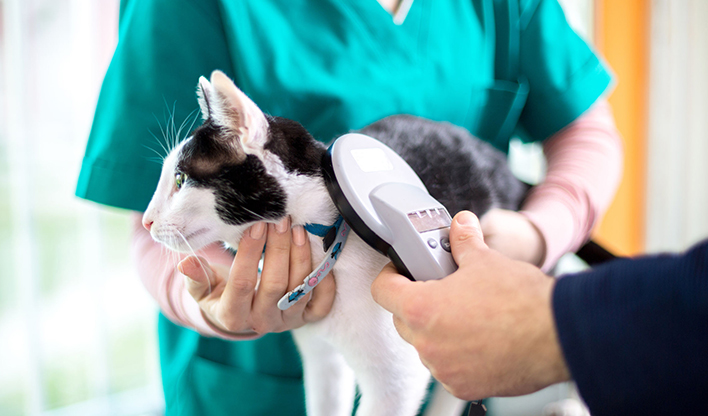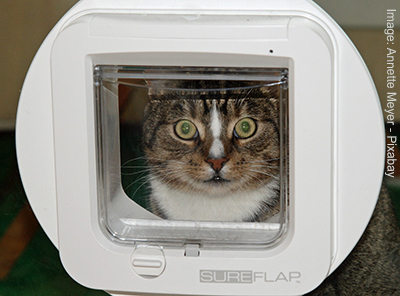Find out more about Microchipping, and why it's so important.
This simple and painless procedure has many benefits, including giving you and your cat the best chance of being re-united if he or she becomes lost.

The safety of our cats is crucial, so it is important we do everything we can to protect them. This is why we should consider the benefits of microchipping for our beloved cats. If your cat is lost or stolen, microchipping gives your cat the best chance of being identified and returned to you.
So how can we protect our cats with microchipping? Below is everything you need to know.
What is Microchipping
Microchipping is an easy and effective way to identify the owner of a pet should they go missing.
It works by simply inserting a tiny microchip under your cat’s skin, just between the shoulders. This is carried out by a vet or other qualified professional using a hypodermic needle, which is painless and takes only a few seconds.
The microchip gives your pet a unique code. Therefore, the microchip can be scanned and traced back to the owner, whose contact details are kept on a database. However, this can only work if the cat’s owner has registered the microchip. This can be registered with the manufacturer of the microchip, or some vet practices may take care of this for you.
You will be sent a microchip registration document, which you should keep somewhere safe in case you need to contact the registration company. It is very important to make sure that your details on the microchip register are always kept up to date!
Compulsory Microchipping
In England, by law you must have your pet cat microchipped by 20 weeks of age. This legislation came into force on June 10th 2024, and owners who don't comply could face a fine of up to £500. The law does not apply to feral or 'community' cats. Microchipping of cats is not yet a legal requirement in Wales or Scotland, but we still strongly recommend that all cat owners have their pets chipped.
What are the benefits?
Increases the chance of being reunited with your cat: Thousands of lost or stray cats brought into rescue centres each year are reunited with their owners, thanks to their microchips. Once paired with the correct contact information and microchip, your cat can easily be located back to you.
Microchips are permanent: Microchips are designed to last the lifetime of a cat, so shouldn't need to be replaced. If your cat wears a collar, you should still get them chipped as collars can get damaged, lost or can be removed.
They cannot be easily removed: Microchips are tiny and cannot be felt underneath the skin, so it would be practically impossible for a thief to remove them.
Proof of ownership: Cats can look very similar, so microchipping can avoid confusion and possible disputes in the neighbourhood.
 Microchip cat flaps: A microchip cat flap can be really useful if there are lots of cats in your neighbourhood. If other cats can access your house, they may take advantage of any spare food, or even cause conflict with your own cat. Your cat’s microchip means only they can get in!
Microchip cat flaps: A microchip cat flap can be really useful if there are lots of cats in your neighbourhood. If other cats can access your house, they may take advantage of any spare food, or even cause conflict with your own cat. Your cat’s microchip means only they can get in!
Peace of mind: Some cats love to wander off exploring, and may go too far. Cats can also get lost if they are chased by another cat or spooked by a loud noise. Microchipping your cat gives you some peace of mind, knowing that when found, they can much more quickly be returned back to you. Rescue centres regularly take in stray cats who have clearly had a home, but they are unable to trace the owner… if only they had been microchipped!
What are the risks?
Reports of pets having an adverse reaction to their microchip are extremely rare, and the benefits far outweigh any potential risk. There are, however some important things to remember:
Keep your contact details up to date: All too often, when a rescue takes in a lost or stray cat, it turns out the details on the microchip register are out of date! So, if you move house or change your phone number, make sure to let the microchip company know; this could make all the difference in reuniting you and your beloved feline.
 Check your microchip company: Most microchip registration companies are long-standing and reliable, but it’s still worth periodically checking that they are still operating. You should be advised if there is any change to where your pet’s microchip is registered, but if you haven’t and they cease operating, your vet will be able to advise about re-registering your pet’s chip.
Check your microchip company: Most microchip registration companies are long-standing and reliable, but it’s still worth periodically checking that they are still operating. You should be advised if there is any change to where your pet’s microchip is registered, but if you haven’t and they cease operating, your vet will be able to advise about re-registering your pet’s chip.
Microchips can move: It’s not very common, but occasionally a microchip can move which may mean it is not discoverable when scanned. When your cat has their annual check-up, ask your vet to do a quick scan to double check their chip is still in the right place.
How long does the microchip last for?
The great thing about microchips is that they are permanent and will last the lifespan of your cat.
When should I do it?
Most cats can be microchipped from the age of 10-12 weeks onwards. If you have adopted a cat from a rescue centre they may already be microchipped, in which case check that the rescue has informed the microchip register of your details as the new owner.
Should I microchip an 'Indoor cat'?
Yes! If your cat doesn't go outdoors, still get them chipped, just in case. If they got outside by accident, such as during building work, they would be more likely to be disorientated and find themselves lost than a cat who is used to being outside.
How much does microchipping cost?
Microchipping should be carried out by a qualified vet or vet nurse to ensure correct placement of the chip. The price of microchipping varies. A UK survey found that vets microchipping costs vary between £9.95 and £20, however some animal welfare organisations do from time-to-time, offer low cost or free microchipping.
If you need any more advice or information regarding microchipping, we recommend you visit your local vet practice, who will be able to answer any other questions you have.
More Information:
Find a vet near you: UK Vet Search
Cat Chat: Lost / Found Cat Advice
Cat Chat Vet Advisor (non-urgent enquiries) - Email: This email address is being protected from spambots. You need JavaScript enabled to view it.
International Cat Care: Importance of Microchipping
Cats Protection: Guide to Microchipping PDF
PDSA: Microchipping Your Pet
Contributor: Stacey Thomas - Cat Chat Volunteer
Published: 10 July 2020, updated 9th October 2024

